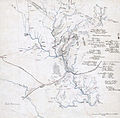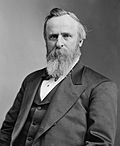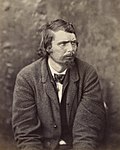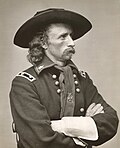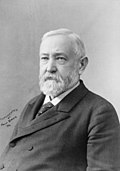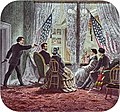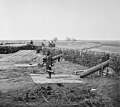Portal:American Civil War
 |
|
 |
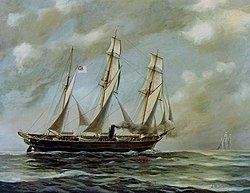

The American Civil War (1861–1865) was a sectional rebellion against the United States of America by the Confederate States, formed of eleven southern states' governments which moved to secede from the Union after the 1860 election of Abraham Lincoln as President of the United States. The Union's victory was eventually achieved by leveraging advantages in population, manufacturing and logistics and through a strategic naval blockade denying the Confederacy access to the world's markets.
In many ways, the conflict's central issues – the enslavement of African Americans, the role of constitutional federal government, and the rights of states – are still not completely resolved. Not surprisingly, the Confederate army's surrender at Appomattox on April 9,1865 did little to change many Americans' attitudes toward the potential powers of central government. The passage of the Thirteenth, Fourteenth and Fifteenth amendments to the Constitution in the years immediately following the war did not change the racial prejudice prevalent among Americans of the day; and the process of Reconstruction did not heal the deeply personal wounds inflicted by four brutal years of war and more than 970,000 casualties – 3 percent of the population, including approximately 560,000 deaths. As a result, controversies affected by the war's unresolved social, political, economic and racial tensions continue to shape contemporary American thought. The causes of the war, the reasons for the outcome, and even the name of the war itself are subjects of much discussion even today. (Full article)
USS Manhattan was a single-turreted Canonicus-class monitor built for the Union Navy during the American Civil War. After commissioning in 1864 the ship was assigned to the West Gulf Blockading Squadron and participated in the Battle of Mobile Bay. At the end of the battle, Manhattan took the surrender of the Confederate casemate ironclad ram Tennessee. She bombarded Fort Morgan during the Siege of Fort Morgan and later blockaded the mouth of the Red River until the end of the war.
The ship was placed in reserve after the end of the war and Manhattan was only occasionally recommissioned before being sold for scrap in 1902. (Full article...)

During the American Civil War, North Carolina joined the Confederacy with some reluctance, mainly due to the presence of Southern Unionist sentiment within the state. A popular vote in February, 1861 on the issue of secession was won by the unionists but not by a wide margin.
This slight lean in favor of staying in the Union would shift towards the Confederacy in response to Abraham Lincoln's April 15 proclamation that requested 75,000 troops from all Union states, leading to North Carolina's secession. Similar to Arkansas, Tennessee, and Virginia, North Carolina wished to remain uninvolved in the likely war but felt forced to pick a side by the proclamation. Throughout the war, North Carolina widely remained a divided state. The population within the Appalachian Mountains in the western part of the state contained large pockets of Unionism. Even so, North Carolina would help contribute a significant amount of troops to the Confederacy, and channeled many vital supplies through the major port of Wilmington, in defiance of the Union blockade. (Full article...)

William McKinley (January 29, 1843 – September 14, 1901) was the 25th president of the United States, serving from 1897 until his assassination in 1901. A member of the Republican Party, he led a realignment that made Republicans largely dominant in the industrial states and nationwide for decades. McKinley successfully led the U.S. in the Spanish–American War and oversaw a period of American expansionism, with the annexations of Hawaii, Puerto Rico, Guam, the Philippines, and American Samoa.
McKinley was the last president to have served in the American Civil War; he was the only one to begin his service as an enlisted man and ended it as a brevet major. After the war, he settled in Canton, Ohio, where he practiced law and married Ida Saxton. In 1876, McKinley was elected to Congress, where he became the Republican expert on the protective tariff, believing protectionism would bring prosperity. His 1890 McKinley Tariff was highly controversial and, together with a Democratic redistricting aimed at gerrymandering him out of office, led to his defeat in the Democratic landslide of 1890. He was elected governor of Ohio in 1891 and 1893, steering a moderate course between capital and labor interests. (Full article...)
- ... that Benjamin Jackson was likely paid at least $300 to fight in the American Civil War as Lewis Saunders?
- ... that Chinese-born Joseph Pierce enlisted as a Union Army soldier, fought at the Battle of Gettysburg during the American Civil War, and was made a corporal?
- ... that Dubuque, Arkansas, was destroyed in the American Civil War and is now covered by the waters of Bull Shoals Lake?
- ... that some Confederate bullets were sourced from a silver mine?
- ... that CSS Beaufort fought USS Albatross in the first ship-versus-ship action of the American Civil War?
- ... that singer Frank Croxton performed a duet with his father for the unveiling of a monument to a Confederate States Army general?
- Attention needed
- ...to referencing and citation • ...to coverage and accuracy • ...to structure • ...to grammar • ...to supporting materials
- Popular pages
- Full list
- Cleanup needed
- The West Tennessee Raids
- Requested articles
- James Ashby (soldier) • Benjamin D. Fearing • James B. Speers • Charles S. Steedman • Battle of Barton's Station • Lawrence P. Graham • Frederick S. Sturmbaugh • Mexico and the American Civil War • Savannah Campaign Confederate order of battle • Native Americans in the American Civil War (currently disambiguation after deletion) • Battle of Lafayette • Battle of Sunshine Church • Tangier Difficulty • Requested American Civil War Medal of Honor recipients
- Expansion needed
- Battle of Boonsborough • Battle of Guard Hill • Battle of Rice's Station • Battle of Simmon's Bluff • Battle of Summit Point • Charleston Arsenal • Edenton Bell Battery • First Battle of Dalton • Blackshear Prison • Edwin Forbes • Hiram B. Granbury • Henry Thomas Harrison • Louis Hébert (colonel) • Benjamin G. Humphreys • Maynard Carbine • Hezekiah G. Spruill • Smith carbine • Edward C. Walthall • Confederate States Secretary of the Navy • Confederate States Secretary of the Treasury • David Henry Williams • Battle of Rome Cross Roads • Delaware in the American Civil War • Ironclad Board • United States Military Railroad • Kansas in the American Civil War • Rufus Daggett • Ebenezer Magoffin • Confederate Quartermaster-General's Department • First Corps, Army of Northern Virginia • Francis Laurens Vinton • Henry Maury • Smith's Expedition to Tupelo • Ambrose Dudley Mann • Patrick Neeson Lynch • Stone Fleet (add international reactions and diplomacy) • Other American Civil War battle stubs • Other American Civil War stubs
- Images needed
- Battle of Lone Jack • Preston Pond, Jr. • Melancthon Smith
- Merging needed
- 1st Regiment New York Mounted Rifles and 7th Regiment New York Volunteer Cavalry
- Citations needed
- 1st Alabama Cavalry Regiment (Union) • 4th Maine Battery • 33rd Ohio Infantry • 110th New York Volunteer Infantry • Battle of Hatcher's Run • Camp Dennison • Confederate colonies • CSS Resolute • Dakota War of 1862 • Florida in the American Civil War • Ethan A. Hitchcock (general) • Fort Harker (Alabama) • Gettysburg (1993 film) • Iowa in the American Civil War • Second Battle of Fort Sumter • Samuel Benton
- Translation needed
- Add an article here!
The following Wikimedia Foundation sister projects provide more on this subject:
-
Commons
Free media repository -
Wikibooks
Free textbooks and manuals -
Wikidata
Free knowledge base -
Wikinews
Free-content news -
Wikiquote
Collection of quotations -
Wikisource
Free-content library -
Wikiversity
Free learning tools -
Wikivoyage
Free travel guide -
Wiktionary
Dictionary and thesaurus
- Shortcuts to this page: Portal:ACW • P:ACW



